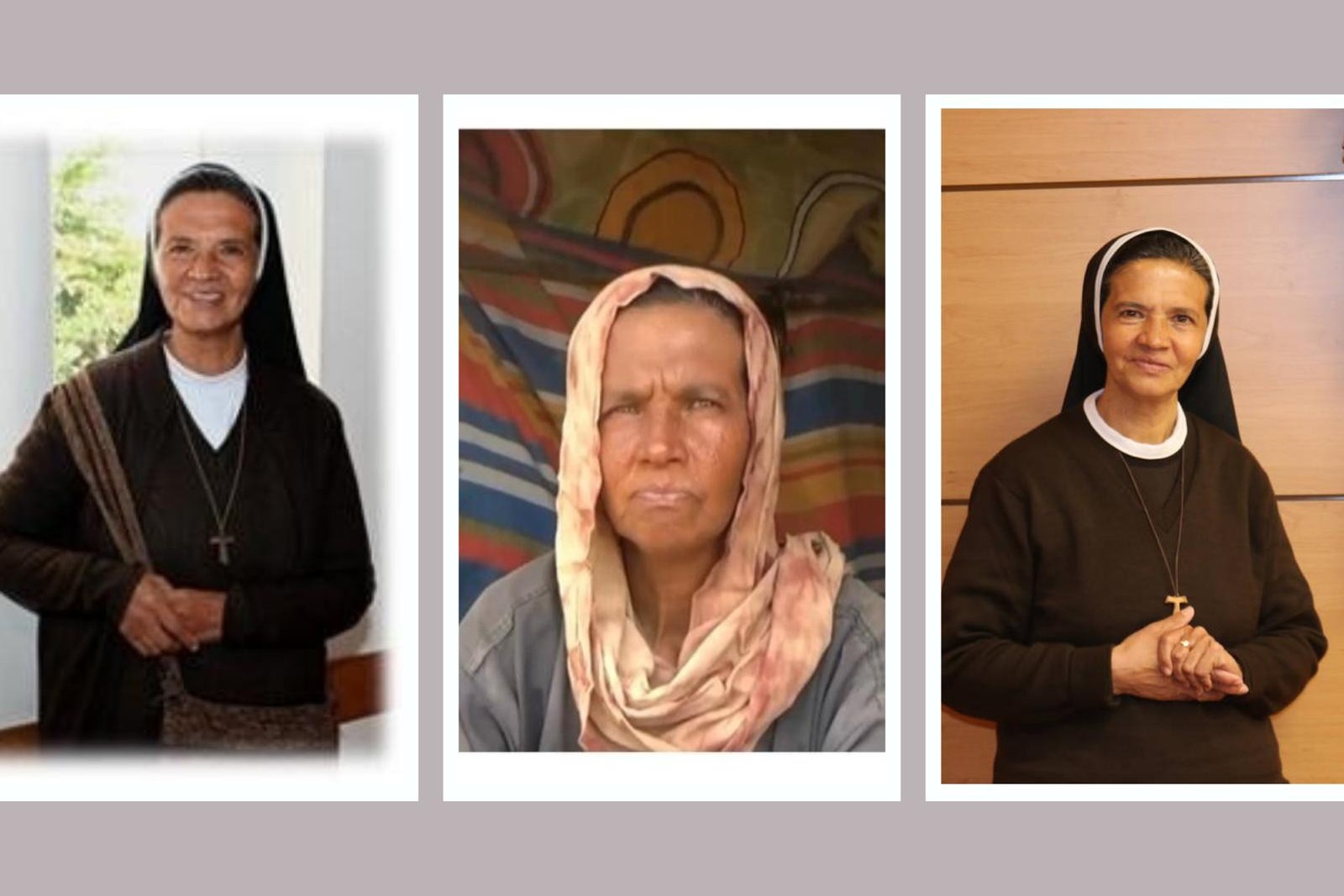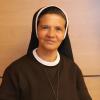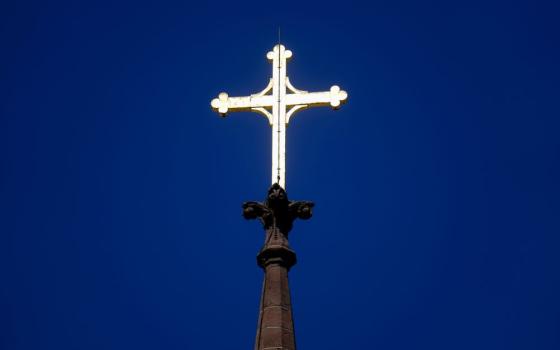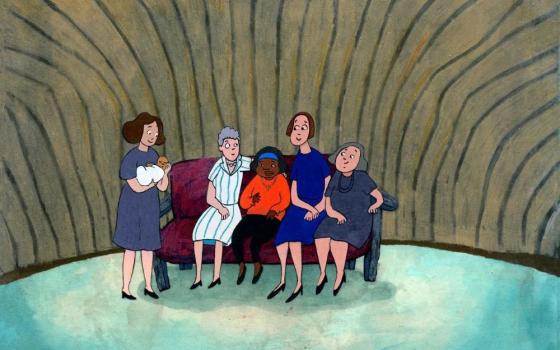Pope Francis blesses Sr. Gloria Cecilia Narváez Argot, a member of the Franciscan Sisters of Mary Immaculate, at the end of Mass in St. Peter's Basilica at the Vatican on Oct. 10, 2021. A Colombian missionary, she was kidnapped in Mali in 2017 and released in early October 2021. (CNS/Vatican Media)
"If we receive Jesus in the Eucharist with faith, he transforms our lives into a gift for God and for our brothers and sisters."
—Pope Francis
In fidelity to our missionary charism as a Franciscan Sister of Mary Immaculate, I arrived in Africa in 2004 — first in Benin, and then in Mali in 2010 — to help in an orphanage and accompany the most vulnerable communities facing a meningitis epidemic in the meningitis belt region of West Africa. In response to our mission to live and proclaim the Gospel in constant availability to God's will, I entered the world of the poor with the certainty that the Lord was waiting for me there.
In a context of growing instability, and violence in a country that is more than 90% Islamic, I took on my mission in this African land with confidence and faith. Despite difficulties, it provided me with encounters full of life, culture and hope. It was in the midst of this daily commitment that I was kidnapped in Mali on Feb. 7, 2017. That day began a long journey of four years and eight months in captivity. Although I could not physically receive the Bread of Life, my eucharistic soul was nourished by heavenly manna, which I kept deep in my soul, and it became life in me, second by second.
Every morning in the desert, as I watched the sunrise, I prayed. It was wonderful to feel the wind — sometimes violent, sometimes gentle — blowing over the sand. I wrote letters to the Creator with chunks of charcoal, expressing my total and unconditional trust in him. It was there that I experienced a true encounter with God of the desert.
Many prayers were born and remained silent. In the solitude of the Sahara desert — among sand dunes, rugged rocks and thorny trees — I prayed with the certainty that they were heard by our Father God.
I used to draw a chalice in the sand, adorned with flowers that resisted the arid soil of the Sahara. Although my captors erased it with insults and punishments, I redrew it with more love.

Sr. Gloria Cecilia Narváez returned to the Colombian Pacific in 2021, where she accompanies women victims of violence in workshops called "Healing Wounds." (Courtesy of Franciscan Sisters of Mary Immaculate)
I fasted from the sacrament of the Eucharist for four years and eight months. That fast, for those who have discovered its value, is more painful than physical fasting. "Who kept me there, my God, if not you?" I made spiritual communions many times a day, and in them I found comfort, which made the prolonged fast I was subjected to, and all the fear I felt in the situation I was in, more bearable. Seeking strength in the Lord, I clung tightly to him to survive with more confidence. This ignited a flame of hope in me.
I used to draw a chalice in the sand, adorned with flowers that resisted the arid soil of the Sahara. Although my captors erased it with insults and punishments, I redrew it with more love. Those images dispelled my fears and strengthened my faith.
The radiant sun each morning transported me to the tabernacle. I received him on my knees, spiritually, each dawn; at night, the moon brought me back into his presence. I repeated: "You are my strength, my serenity, my sweetness, my greatness." In this way, I remembered the attributes with which our seraphic father, St. Francis of Assisi, sang to the Lord.
There is a tabernacle everywhere. At that time, mine was in the desert. Again and again, I pronounced the words of the eucharistic prayer: "It is right and just to give you thanks, here and everywhere, holy Father." The words of Jesus at the Last Supper resounded within me: "Take and eat, this is my body ... take and drink, this is my blood." Understanding this divine gift filled me with certainty: He was with me. I felt him in the breeze, even when temperatures exceeded 50 or 60 degrees Celsius. In the punishments for professing my faith, I was united more deeply with the passion of Christ. My life was his.
Blessed María Caridad Brader Zanher, founder of our Congregation of Franciscan Sisters of Mary Immaculate, accompanied my steps, like a good mother. I was inspired by her boldness, her missionary courage, her love for Jesus in the Eucharist, and her spirituality, which encouraged me to place myself totally in Jesus' hands. Contemplating the sun in the midst of darkness was to see in it the presence of Jesus in the Eucharist in my days of darkness.
Advertisement
Thanks to God's goodness and the many prayers offered for my freedom, I was released from captivity on Oct. 9, 2021. I left the desert behind and was quickly transferred from Mali to Rome. There, in the chapel of the Casa Santa Marta, I knelt before the tabernacle and, with tears in my eyes, thanked the Lord for the gift of freedom.
I celebrated my first Eucharist, after almost five years, in St. Peter's Basilica, at the hands of Pope Francis, whom I remember with great affection. His words still echo in my ears: "You sustained the church, and the church sustained you."
Today, I am on mission in the Colombian Pacific. I am in good health — another miracle attributed to God — and I accompany women victims of violence in workshops called "Healing Wounds."
The experience of living in captivity taught me many important lessons. Now, every time I adore Jesus in the tabernacle or receive him sacramentally, I am overcome with love. Contemplating him in the early morning gives me the strength to bring that tabernacle to so many faces wounded by despair, pain and sadness.
The eucharistic fast I experienced in the desert marked me deeply and reaffirmed the greatness of being able to receive Jesus in the consecrated host.
God be blessed, now and forever!






